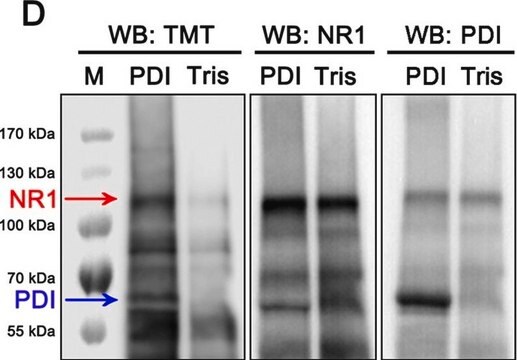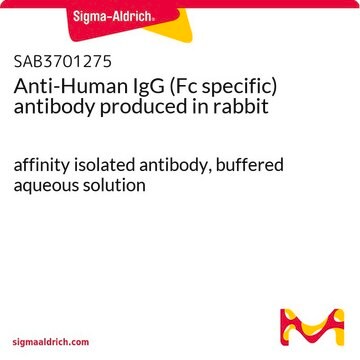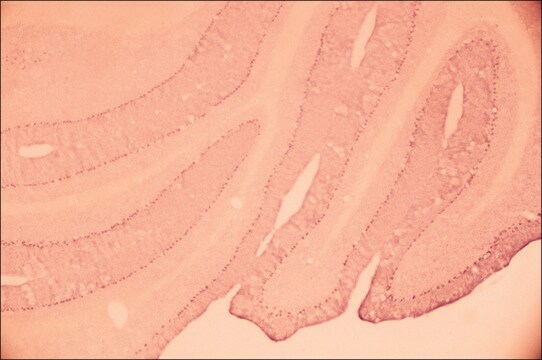おすすめの製品
由来生物
mouse
品質水準
抗体製品の状態
affinity purified immunoglobulin
抗体製品タイプ
primary antibodies
クローン
R1JHL, monoclonal
化学種の反応性
mouse, rat, human
メーカー/製品名
Chemicon®
テクニック
western blot: suitable
アイソタイプ
Not specified
NCBIアクセッション番号
UniProtアクセッション番号
輸送温度
dry ice
ターゲットの翻訳後修飾
unmodified
遺伝子情報
human ... GRIN1(2902)
mouse ... Grin1(14810)
rat ... Grin1(24408)
特異性
NMDA receptor subunit 1 (all splice variants). No cross-reactivity observed with other NMDA receptor subunits. Recognizes a 103-116 kDa protein in rat brain hippocampal homogenate by immunoblot.
免疫原
Epitope: (all splice variants)
Fusion protein of amino acids 1-564 from rat NR1.
アプリケーション
Research Category
ニューロサイエンス
ニューロサイエンス
Research Sub Category
神経伝達物質及び受容体
神経伝達物質及び受容体
Detect NMDAR1 using this Anti-NMDAR1 Antibody, (all splice variants), clone R1JHL validated for use in WB.
Western blot: 1:300. It is recommended that the antibody be diluted in TBST (20 mM Tris-HCl, 137 mM NaCl, 1% Tween-20, pH 7.6) containing 5% nonfat milk and 0.05% sodium azide. The diluted antibody can be used at least 5 times without a significant signal decrease. Store at 2-8°C between uses.
Immunoprecipitation: 3 μg per 200 μg of lysate will quantitatively precipitate all the NMDA R1 in 200 μg of rat brain lysate.
Optimal working dilutions must be determined by end user.
Immunoprecipitation: 3 μg per 200 μg of lysate will quantitatively precipitate all the NMDA R1 in 200 μg of rat brain lysate.
Optimal working dilutions must be determined by end user.
物理的形状
Affinity purified immunoglobulin. Lyophilized. Reconstitute with 50 μL of PBS, pH 7.4. Contains no preservative.
Format: Purified
保管および安定性
Maintain lyophilized material at -20°C for up to six months after date of receipt. After reconstitution, maintain at -20°C in undiluted aliquots for up to six months. Avoid repeated freeze/thaw cycles.
法的情報
CHEMICON is a registered trademark of Merck KGaA, Darmstadt, Germany
免責事項
Unless otherwise stated in our catalog or other company documentation accompanying the product(s), our products are intended for research use only and are not to be used for any other purpose, which includes but is not limited to, unauthorized commercial uses, in vitro diagnostic uses, ex vivo or in vivo therapeutic uses or any type of consumption or application to humans or animals.
適切な製品が見つかりませんか。
製品選択ツール.をお試しください
保管分類コード
10 - Combustible liquids
WGK
WGK 1
引火点(°F)
Not applicable
引火点(℃)
Not applicable
適用法令
試験研究用途を考慮した関連法令を主に挙げております。化学物質以外については、一部の情報のみ提供しています。 製品を安全かつ合法的に使用することは、使用者の義務です。最新情報により修正される場合があります。WEBの反映には時間を要することがあるため、適宜SDSをご参照ください。
Jan Code
MAB1586:
試験成績書(COA)
製品のロット番号・バッチ番号を入力して、試験成績書(COA) を検索できます。ロット番号・バッチ番号は、製品ラベルに「Lot」または「Batch」に続いて記載されています。
María Rodríguez-Muñoz et al.
Oncotarget, 6(34), 35458-35477 (2015-10-16)
In the brain, the histidine triad nucleotide-binding protein 1 (HINT1) and sigma 1 receptors (σ1Rs) coordinate the activity of certain G-protein coupled receptors (GPCRs) with that of glutamate N-methyl-D-aspartate receptors (NMDARs). To determine the role of HINT1-σ1R in the plasticity
Lenka Mikasova et al.
Brain : a journal of neurology, 135(Pt 5), 1606-1621 (2012-05-01)
Autoimmune synaptic encephalitides are recently described human brain diseases leading to psychiatric and neurological syndromes through inappropriate brain-autoantibody interactions. The most frequent synaptic autoimmune encephalitis is associated with autoantibodies against extracellular domains of the glutamatergic N-methyl-d-aspartate receptor, with patients developing
Meilin Tian et al.
Scientific reports, 6, 34751-34751 (2016-10-08)
Allostery is essential to neuronal receptor function, but its transient nature poses a challenge for characterization. The N-terminal domains (NTDs) distinct from ligand binding domains are a major locus for allosteric regulation of NMDA receptors (NMDARs), where different modulatory binding
Nami Tajima et al.
Nature, 534(7605), 63-68 (2016-05-03)
The physiology of N-methyl-d-aspartate (NMDA) receptors is fundamental to brain development and function. NMDA receptors are ionotropic glutamate receptors that function as heterotetramers composed mainly of GluN1 and GluN2 subunits. Activation of NMDA receptors requires binding of neurotransmitter agonists to
Katharine R Smith et al.
The Journal of biological chemistry, 292(49), 20173-20183 (2017-10-20)
Brain ischemia causes oxygen and glucose deprivation (OGD) in neurons, triggering a cascade of events leading to synaptic accumulation of glutamate. Excessive activation of glutamate receptors causes excitotoxicity and delayed cell death in vulnerable neurons. Following global cerebral ischemia, hippocampal
ライフサイエンス、有機合成、材料科学、クロマトグラフィー、分析など、あらゆる分野の研究に経験のあるメンバーがおります。.
製品に関するお問い合わせはこちら(テクニカルサービス)








